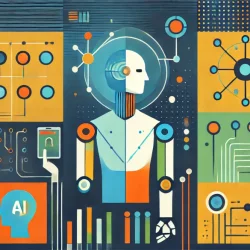AI in Healthcare: Transforming Diagnosis and Patient Outcomes
Artificial Intelligence (AI) is at the forefront of a technological revolution that is reshaping various industries, and healthcare is no exception. Among the most transformative areas within healthcare is diagnostics. AI's capabilities are enhancing how diseases are detected, understood, and treated, leading to better patient outcomes. In this article, we'll delve deeply into how AI is revolutionizing diagnostics and patient care.
How AI is Transforming Diagnostics
Enhanced Data Analysis
AI is revolutionizing diagnostics through its remarkable ability to analyze massive datasets. Imagine the daunting task of sifting through mountains of medical records, imaging scans, and genetic information. For a physician or scientist, such an endeavor would be near impossible. However, AI thrives on large volumes of data. By uncovering hidden patterns and subtle anomalies, AI algorithms can assist healthcare professionals in identifying diseases earlier and more accurately. This capability is particularly beneficial for complex illnesses or those with varied presentations.
For instance, AI can analyze thousands of radiology images to identify early signs of conditions such as lung cancer or stroke. Studies published in Nature Medicine show that AI can match or even surpass human experts in diagnostic accuracy, significantly improving early detection rates and patient survival. Furthermore, AI's ability to integrate various types of data, including genomic information and electronic health records (EHRs), enables a holistic view of patient health, which is crucial for comprehensive diagnostics.
Streamlining Workflows
Another exciting application of AI in diagnostics is its ability to streamline workflows. AI-powered tools can automate repetitive tasks such as image analysis or data interpretation, thereby freeing up valuable time for doctors to focus on what matters most—their patients. This improvement in efficiency allows for a more personalized approach to care.
With the help of AI, physicians can delve deeper into individual cases, tailoring treatment plans to each patient's unique needs. For example, an AI system might analyze a patient's medical history, genetic makeup, and lifestyle factors to recommend the most effective treatment options. According to the Harvard Business Review, AI's role in personalizing care is revolutionizing patient management and treatment efficacy.
In addition to enhancing patient care, AI-driven workflow optimization can lead to significant cost savings for healthcare facilities. By reducing the time spent on administrative tasks and minimizing diagnostic errors, hospitals and clinics can allocate resources more efficiently, ultimately leading to better patient outcomes and reduced healthcare costs.
Augmenting Human Expertise
AI is not a replacement for human expertise but a powerful tool that can augment a doctor's skills and knowledge. The human element remains crucial, especially when it comes to patient interaction, empathy, and the ability to explain complex diagnoses clearly and compassionately.
AI can provide doctors with decision support tools, offering evidence-based recommendations and highlighting potential issues that might have been overlooked. This collaboration between humans and machines ensures that patients receive the most accurate and compassionate care possible.
For example, AI-powered diagnostic systems can assist in identifying rare diseases that may be difficult for human doctors to diagnose due to their limited exposure to such cases. By leveraging vast datasets and advanced algorithms, AI can recognize patterns and symptoms that might elude even seasoned professionals. The result is a more accurate and timely diagnosis, which is critical for initiating appropriate treatment and improving patient outcomes.
AI in Specific Diagnostic Areas
If you have been trying to keep up with AI News, you will know that AI's impact on diagnostics is not limited to a single area but spans across various medical fields. Here are a few notable examples:
Radiology
In radiology, AI algorithms are being used to analyze medical images with exceptional accuracy. AI can detect abnormalities in X-rays, CT scans, and MRIs that might be missed by the human eye. For instance, AI has shown remarkable proficiency in identifying breast cancer in mammograms, leading to earlier detection and treatment. According to a study published in The Lancet Digital Health, AI performed better than radiologists in diagnosing breast cancer from mammograms.
Pathology
In pathology, AI-driven image analysis is transforming the way tissue samples are examined. AI can analyze histopathological slides to identify cancerous cells and other abnormalities with high precision. This reduces the risk of human error and ensures that pathologists can focus on the most critical cases. AI's ability to process large volumes of data quickly also accelerates the diagnostic process, allowing for faster treatment decisions.
Cardiology
AI is making significant strides in cardiology as well. AI algorithms can analyze electrocardiograms (ECGs) to detect arrhythmias and other heart conditions with greater accuracy than conventional methods. Additionally, AI can predict the risk of cardiovascular events by analyzing patient data, enabling proactive interventions that can save lives. A study in the Journal of the American College of Cardiology demonstrated that AI could predict heart attacks more accurately than traditional risk assessment models.
Genomics
The field of genomics is another area where AI is having a profound impact. AI-powered tools can analyze genetic data to identify mutations associated with various diseases, including cancer and rare genetic disorders. This information can be used to develop personalized treatment plans based on an individual's genetic makeup. AI's ability to process vast amounts of genomic data quickly is accelerating the discovery of new biomarkers and potential therapeutic targets.
The Future of Diagnostics with AI
At Cost Plus Medical Technologies, we are committed to harnessing the power of AI to create a future where diagnostic testing is faster and more accurate. Our goal is to ultimately lead to better patient outcomes. We believe that by working together—doctors, scientists, and AI developers—we can unlock a new era in healthcare that empowers patients and improves lives.
The potential of AI in diagnostics extends beyond individual patient care. AI can also play a crucial role in public health by analyzing trends and patterns in large datasets to identify emerging health threats. For example, AI has been instrumental in tracking and predicting the spread of infectious diseases like COVID-19. By analyzing real-time data from various sources, AI can provide early warnings and support public health officials in implementing timely interventions to mitigate the impact of outbreaks.
Moreover, AI-driven diagnostic tools are becoming more accessible to patients outside traditional healthcare settings. For instance, AI-powered mobile apps can analyze symptoms and provide preliminary diagnoses, enabling individuals to seek medical attention promptly. This democratization of diagnostic technology has the potential to improve healthcare access and outcomes, particularly in underserved communities.
Conclusion
As AI continues to integrate into healthcare, the field of diagnostics stands to gain immensely. From enhanced data analysis and streamlined workflows to augmenting human expertise, AI is set to transform how we diagnose and treat diseases. The future of diagnostics is bright, and we are at the forefront of this exciting revolution.
Are you ready to participate in this revolution? Discover more about our solutions, including our COVID Rapid Test Kits, as we explore the endless possibilities of AI in diagnostics.
By embracing AI, we are not just enhancing diagnostic accuracy but also paving the way for a more patient-centric healthcare system. The journey has just begun, and the possibilities are endless.
More to Read:
Previous Posts:






